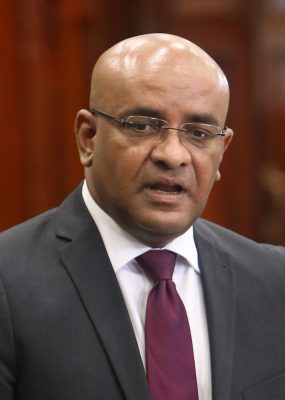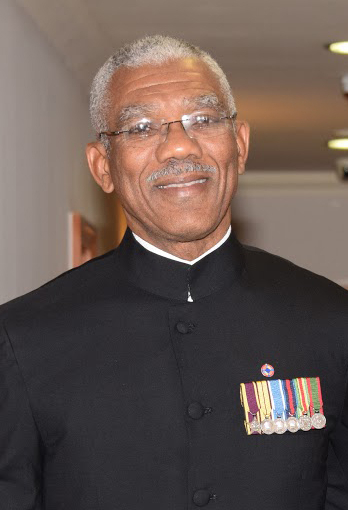Following opposition leader Bharrat Jagdeo’s request that Cabinet immediately resign in keeping with the constitutional provisions triggered by the passage of the no-confidence motion against government, President David Granger has said that Attorney General Basil Williams is handling it.
On June 20th, more than a month after the Caribbean Court of Justice (CCJ) ruled that the December 21st no-confidence motion against government was validly passed, Jagdeo wrote Granger, requesting that he and his Cabinet resign forthwith in accordance with the June 18th decision and the July 12th consequential orders.
In the letter, released to the press, Jagdeo also urged the president to issue a proclamation dissolving the 11th Parliament and fixing a date for regional and general elections not beyond September 18th, 2019.

Jagdeo’s office released the president’s response yesterday. “Your requests are being handled by the Attorney General in light of the constitution and the relevant rulings of the Caribbean Court of Justice,” Granger wrote in a letter, dated July 26th.
When contacted by this newspaper yesterday, Jagdeo indicated that he had “no further comment at this time.”
Since the June 18th ruling, there continues to be calls for the Cabinet, including the president, to resign in keeping with the provisions of Article 106(6) and name a date for elections in keeping with Article 106 (7). While saying that it respect’s the decision of the court, government has maintained that Cabinet is still functioning, without explaining the inconsistency of its position with Article 106(6).
On Thursday, Granger sought to reassure members of the diplomatic community and civil society that his government was not seeking to delay elections. The president met in the morning with the diplomatic community and in the afternoon with civil society and told both groups that the Government of Guyana is committed to upholding the Constitution; respecting the institutions of the State – including the National Assembly and the Courts; ensuring the rule of law; safeguarding human and civil rights; and preserving democracy especially through the conduct of free, fair and credible Local as well as General and Regional Elections.
He revealed that he has been required to present his government’s case to the Caribbean Community (CARICOM) once since the ruling and twice to the Commonwealth Secretary General.
Guyana, which is currently one of the eight members of the Common-wealth Ministerial Action Group on the Harare Declaration (CMAG), could be at risk of sanctions, including suspension from the Commonwealth of Nations, if it is found that government is engaged in the “unjustified postponement of elections” or the “undermining of the judiciary.”
Granger took pains to dispel any such concerns, arguing that recent political developments have been subject to some misinterpretation and misrepresentation of government’s intentions.
“We have upheld the Constitution…the legal processes which we initiated were neither frivolous nor calculated to delay the consequences of the no-confidence vote,” he stressed.
The president’s has repeatedly stated that he accepts his government’s interim status, while maintaining that only the Guyana Elections Commission (GECOM) can set the date of elections.
He also maintains that ongoing house-to-house registration is necessary to create a “credible” voters’ list before general and regional elections.
Granger has argued that the previous falls short of acceptable standards and cannot guarantee free, fair and credible elections so a new list needs to be constituted and it has been recommended that this should be done through a process of ‘house-to-house’ registration.
However the opposition has drawn attention to statements by Chief Elections Officer (CEO) Keith Lowenfield that claims of a “bloated” voters’ list are speculative.
Lowenfield has also maintained that the last valid list can be updated via a claims and objections process.
Jagdeo had also provided reporters with a copy of Mission Report from a United Nations Needs Assessment team which argued that “there is no certainty that a new voters’ list will have more credibility than the current list…”
“Furthermore any list created close to election will likely be criticized as politically motivated,” the report concluded.




